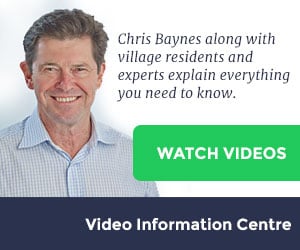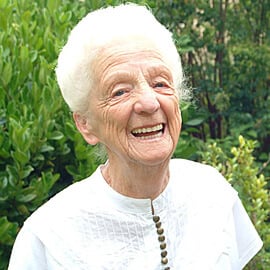Many Australians were stunned by the news - and irony - of one of the country's favourite and most respected doctors being diagnosed with brain cancer.
Professor Chris O'Brien had developed a loyal following for his remarkable work and empathy during his 12 years on the top-rating television program, RPA. Yet, suddenly he was on the receiving end of news he had so often been forced to deliver. Few knew better than Chris what his real prognosis was; his type of cancer has a less than one percent chance of survival. He was given just six to twelve months to live - that was nearly two years ago.
Chris has what he always offered his patients: hope. He also has a dream he wishes to fulfill, and he is asking for your help.
He wants to establish a world-class comprehensive cancer centre, a place where "as people walk in they can exhale their anxieties and breathe in hope."
By making his own cancer journey public, he has been able to raise nearly $150 million in cash and resources. He needs another $50 million. Over the next few pages, Chris talks about his experience, plus what the comprehensive cancer centre will achieve for Australia and Australians.
Perhaps after reading his inspiring message, you will be able to spare five to 10 dollars or more to help Chris achieve his goal. Just think - one day it might be your turn to "exhale anxiety and breathe in hope."
Chris O'Brien
"You know, I am experiencing what cancer patients experience. That is, I was given a very bad prognosis, I was told I had between six and 12 months to live, and that was 20 months ago. I had three operations and we thought I was making good progress, but I had to have a fourth operation three weeks ago because there was a nodular recurrence there. I have just gone back on chemotherapy."
"But I have hope, and because I have hope I am pursuing all the things that can get my body and mind back into balance. I am taking herbal medicine - my oncologist, Helen Wheeler, doesn't like it because it's an unproven therapy and that is contradictory to what oncologists believe in. But the idea that I got cancer, as for whatever reason my body got out of harmony or out of balance, that sort of makes sense to me. I've been very careful with my diet - I've dropped red meat all together. Lots of fresh fruit and vegetables. No caffeine. Exercise and meditation - I do transcendental meditation now. But I still have a little bit of red wine!"
"I think my experience as a cancer patient has helped me with our planning for the cancer centre and what the needs are there. I have said a couple of times if I went back to practicing, I'd do things a little bit differently."
"I think I've learnt a bit about uncertainty. With my particular tumour, for example, there is no expert, no one place that deals with brain cancers at a world-class level. There are a couple of good surgeons, there are a couple of good oncologists, but they're not necessarily at the same hospital. That's the way things are set up - we don't have a system that encourages people to collaborate."
"People work in their little enclaves, they stay in their silos and because of jealousies and egos and things, people don't want to share. That's something Kerry Packer used to say to me: ‘Why don't you people get together.' He was absolutely right. Anything we discover at our centre that's new, we will be happy to share it as quickly as possible with other people and other doctors."
"I guess I've learnt that even when the chips are right down, maintaining hope is vital. People talk about false hope, but I agree with those that say there is no such thing as false hope, there is only hope. Sometimes when everything's lost and people are still hoping for a cure, well maybe that hope is not totally realistic, but they can still hope - you don't tell them to stop hoping, you don't tell them to give up. So I think optimism and hope will be fundamental to the whole ethos of this cancer centre."
"The principle idea is to have really cutting edge, clinical care driven by research - research is really at the core of what our cancer centre is going to be all about."
"It's also incredibly important that people be offered what's called multi-disciplinary treatment. That is, they don't just see a surgeon who says, ‘Well you need an operation,' or a radiotherapist who says, ‘Well you need radiotherapy.' What they do is they go to a multi-disciplinary team who ask, ‘What's best for this guy?' And someone says, ‘Well let's give him some chemotherapy first, shrink it down and then take it out, and then give him some radiotherapy.' That's multi-disciplinary treatment."
"The other idea is to have nurse care coordinators that assist the patient and their family, because there can be a lot of gaps. The doctor doesn't turn up - ‘Oh, he's on holidays.' A patient comes 400 miles for an appointment - ‘Oh, the doctor's not here today, he has a cold.' Things are happening to patients all the time, there is always the potential for them to fall between the gaps. Providing that extra layer of care is very important and that's another thing our comprehensive cancer centre will do."
"Our aim is to also incorporate a facility we will call our wellness centre - a place for complementary and alternative therapies, meditation and massage. Patients in Australia and all over the Western world have embraced these alternatives like there's no tomorrow because there are so many gaps in what conventional medicine can provide. What we would like to do is offer these things to patients in a scientific environment so we can test what works and what doesn't, and if things work we can roll them out to more people."
"We also want a building that captures the imagination, that as people walk into it they feel they can exhale their anxieties and breathe in hope. I think that's the idea, that they will say, ‘Wow, aren't we glad we've come to this place.'"
"Now that means there will be a huge responsibility on the people working in the centre to provide the very best of care, and that's all the clinical people - doctors, nurses and so on. When I was Director of the Sydney Cancer Centre, the ethos that we tried to develop was that at every point of patient contact, everyone had to give the best care that they could. Whether it is the cleaner giving directions, the nurse taking a patient to recovery from the operating theatre, or a big-time oncologist seeing a patient for the first time - the most important thing is that people get good care and they are treated kindly and professionally."
Australia's challenge
"We have an immense challenge with cancer - almost 110,000 Australians are diagnosed each year, with 40,000 dying. If 40,000 Australians died from an infectious disease, from car or work-related accidents, there would be a terrible outcry. But 40,000 deaths from cancer is quietly regarded as being a fact of life in contemporary Australia."
"I think we've got a bit complacent because in general our cure rates are very good, they are the equal of anywhere in the world. Still, fewer than half the women who develop ovarian cancer survive, along with just 13 percent of people with lung cancer. The predicted survival rate for those with my form of brain cancer is barely one percent. So we need to do something about this."
"Doctors boast the five-year survival rate for breast cancer is now 85 percent, which it is. But a five-year survival rate is meaningless - look at poor Jane McGrath, she died 11 years after her diagnosis, so she would have been a five-year survivor."
"Cancer numbers will only increase as the population ages and grows; we need to prepare ourselves to be able to cope. We can do this through research and clinical trials and by improving treatment, and the world's best model for doing these things is the comprehensive cancer centre."
Not a new idea
"This is not a new idea. While he may have done a lot of bad things, then president Richard Nixon declared war on cancer in 1971 by signing the National Cancer Act. As a result, there are now 60 cancer centres in the US, with 15 more planned for the next five years."
"Countries around the world have followed the US lead and moved towards comprehensive cancer centres. These institutions are known to encourage a concentration of talent, expertise and resources that leads to better treatment outcomes, increased patient participation in clinical trials, and the rapid translation of basic research findings to improved care - the ‘bench to bedside' process."
"But in Australia, we continue to rely on the centuries-old teaching hospital system we inherited from England - a system that is incredibly limiting and offers little to people like me with rare or poor prognoses. This model may have served the people of New South Wales and Australia well for nearly two centuries, but we now need at least one world-class centre where diagnosis, cutting-edge treatment, caring cancer support, high-quality research and a fertile academic environment are integrated to facilitate ground-breaking discoveries, the development of new and innovative therapies and the achievement of better treatment outcomes."
"When I took over as Director of the Sydney Cancer Centre in October 2003, I inherited a sort of a foetal plan to do something like this - what they wanted to do was raise $5 million and put another floor on the Cancer Centre building. I just looked at that plan and said, 'Well, I think this is a waste of $5 million. Why don't we do this properly and build a proper cancer centre?' So that's what we want to do: build a comprehensive cancer centre on the Royal Prince Alfred Sydney University Campus."
"This is something for the people of Sydney, for the people of New South Wales. We are not saying we want to build the cancer centre for Sydney - I mean, there are lots of other hospitals that do a great job, we are not trying to corner the market or claim that we are the world's best or first or anything like that. All we want to do is provide better facilities for our patients and doctors, to do things better. And we think the best way to achieve that is to build a new, bigger building where we can have research and care seamlessly co-located."
"The new building we want to build, it will cost between $150 and $200 million. We've got the support of the Premier and the Health Department, the Director-General of Health is very keen on it. The Prime Minister is very keen on it as well - he has pledged $50 million and has more or less indicated we will get more."
"The State Government has given us $1 million, and will provide about $40 or $50 million worth in kind. What we want from them is land; there is a building there at the moment that we need to pull down. We want them to throw in as well the Department of Radiation Oncology that we currently have - we want that to be part of the Cancer Centre. We still haven't finalised our negotiations with the University, but I hope their contribution is in the order of $30 to $50 million.
"The University will benefit enormously because overseas students will want to come and do higher degrees here, the academic side will be tremendously important."
"What we would also like to do is create the opportunity for some real philanthropy. I mean, philanthropy in Australia is incredibly poorly developed. Kerry Packer gave Prince Alfred $10 million during his lifetime. He gave away a total of about $30 million - I think St. Vincent's got $10 million, Westmead Children's Hospital got $10 million, and we got $10 million. I think we really have to try and crack this philanthropic nut, and I think this is a great opportunity to do it."
"At the moment, we've got about $9 million in the bank - that's money we've already raised, though our capital appeal hasn't started yet. We are in the process of rebranding the Cancer Centre, because we've experienced difficulty with identity and visibility - the cancer charity landscape in Australia is very crowded and confusing. So our identity and visibility needs to be grown and then we'll really go hard with a capital appeal, we will need to raise $50 million from that. Our plan is to probably launch around September - a new name, a new logo, a new identity. We have the site chosen, we've got some early drawings. We will probably open the doors in 2012 - we will be digging a hole in a couple of years."
Older Australians and cancer
"Older Australians, I don't think they should allow themselves to either write themselves off or be written off by their families or doctors."
"There is a frame of mind that says, ‘Well, you've got to die of something.' But you don't have to, you don't have to die of cancer. Even if a woman is 80, she should still check her breasts and have a pap smear. And an elderly man who is 70 has a very high likelihood of developing prostate cancer, so he should go and have it checked. I think old age should not prevent or preclude people from going along and getting checked out - they should pursue every opportunity they've got to keep their lives full and fruitful."
"I think one of the most important things that older people need to do is to stay mobile. Loss of mobility is probably the single most greatest cause of people dying when they are older but earlier than they need to. So maintaining mobility is incredibly important. For example, people in retirement villages, when there is an opportunity to go to the exercise classes, they should do it, and not only that they should do a resistance exercise too - so they should get some little weights and they should work their muscles to retain muscles tone."
Cancer has been a gift
"This cancer has been a gift. People might think ‘some gift,' but it has given me an opportunity to re-evaluate my life. I set two goals: to write a book and have a world-class cancer centre built. The book is finished, I just took delivery of the page proofs today. It will be published in October and the Prime Minister has said he would launch it for me."
"And I've said to a number of people, the building that we're going to pull down on Missenden Road, it's called the Page Chess Pavilion - it's where all the lung and heart surgery was done. My uncle Dick Healy, who was a Liberal politician, opened that building as Health Minister during the 1960s. I think it would be a nice irony if I pulled down what my Uncle Dick set up!"
"You see, I remain very optimistic and confident about the future. There is still a lot of uncertainty, but I think if I continue to work at my treatment and so on, I think I can look forward to a long and happy future. I‘d like to be there on the dais when the centre opens."
To make a donation to Professor Chris O'Brien's comprehensive cancer centre, you can send a cheque to:
Sydney Cancer Centre
PO Box M5
Missenden Road
Camperdown NSW 2050
Please call (02) 9515 6018 or visit Sydney Cancer for more information.





